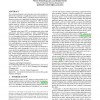Free Online Productivity Tools
i2Speak
i2Symbol
i2OCR
iTex2Img
iWeb2Print
iWeb2Shot
i2Type
iPdf2Split
iPdf2Merge
i2Bopomofo
i2Arabic
i2Style
i2Image
i2PDF
iLatex2Rtf
Sci2ools
152
click to vote
EUROSYS
2008
ACM
2008
ACM
Manageable fine-grained information flow
The continuing frequency and seriousness of security incidents underlines the importance of application security. Decentralized information flow control (DIFC), a promising tool for improving application security, gives application developers fine-grained control over security policy and privilege management. DIFC developers can partition much application functionality into untrusted components bound by a kernel- or language-enforced security policy. Unless a (usually smaller and less exposed) trusted component is exploited, the effects of an application compromise are contained by the policy. Although system-based DIFC can simultaneously achieve high performance and effective isolation, it offers a challenging programming model. Fine-grained policy specifications are spread over several application pieces. Common programming errors may be indistinguishable from policy exploit attempts; the system cannot expose developers to information about these errors, complicating debugging. S...
Application-wide Security Policy | EUROSYS 2008 | Language-enforced Security Policy | Security Policy | System Software |
Related Content
| Added | 10 Mar 2010 |
| Updated | 10 Mar 2010 |
| Type | Conference |
| Year | 2008 |
| Where | EUROSYS |
| Authors | Petros Efstathopoulos, Eddie Kohler |
Comments (0)

